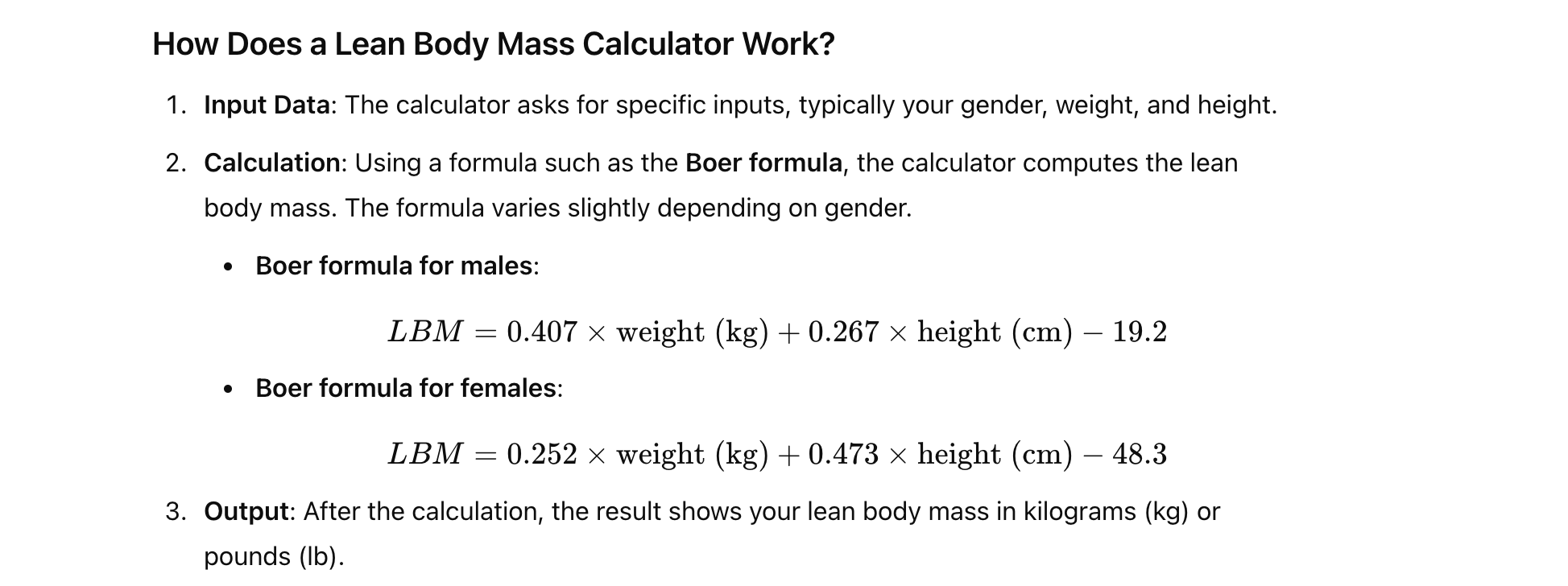A Lean Body Mass Calculator (LBM Calculator)is a tool that estimates the amount of lean mass in your body. Lean body mass refers to the total weight of your body minus the fat. This includes muscles, bones, organs, skin, and water. It is an important metric for assessing overall fitness and health because it shows how much of your body weight is composed of essential, functional tissue rather than fat.
Lean Body Mass Calculator
Lean Body Mass Calculator

Advantages of a Lean Body Mass Calculator
Tracks Muscle Development: Knowing your lean body mass helps you track muscle growth, especially if you’re doing strength training or bodybuilding. Changes in LBM over time can indicate muscle gain or loss.
Better Health Assessments: LBM gives a more accurate picture of your body composition. Unlike simple weight measurements, it differentiates between fat and muscle, which is crucial for understanding overall health.
Helps Design Fitness Programs: Knowing your LBM can help personal trainers or health professionals design workout and nutrition plans tailored to your body’s needs. It’s especially useful for athletes aiming to maximize performance and minimize fat mass.
Monitors Progress in Weight Loss: For people on a weight loss journey, tracking LBM ensures that weight loss comes from fat rather than muscle. Retaining muscle mass during weight loss is important for maintaining metabolism and strength.
Customizes Nutrition Needs: Knowing your lean body mass can help calculate basal metabolic rate (BMR) more accurately, which is the number of calories your body needs to function at rest. This, in turn, helps create a customized nutrition plan to meet your goals.
Useful for Medical Assessments: LBM is often used in medical settings to evaluate a patient’s nutritional status, especially for the elderly or those recovering from illnesses. Having a higher LBM is linked to better health outcomes.
Conclusion
A Lean Body Mass Calculator is a useful tool for anyone interested in fitness, weight loss, or general health. It gives a more detailed look at body composition than standard weight measurements, helping to track muscle mass, and health progress, and guide nutrition and exercise planning.
While understanding your Lean Body Mass (LBM) helps you gauge your physical fitness and body composition, have you ever thought about measuring your cognitive abilities? Alongside your LBM, your intellectual performance is another important aspect of overall health and wellness. Curious to know how your cognitive abilities compare to others? Check out our IQ Percentile Calculator, which lets you measure where you stand on the intelligence scale
FAQs
Q1: What is Lean Body Mass (LBM)?
A: Lean Body Mass refers to the total weight of your body minus the weight of fat. It includes muscles, bones, organs, skin, and water. LBM is often used to assess body composition and overall fitness.
Q2: How is Lean Body Mass different from Body Fat?
A: Lean Body Mass consists of everything in your body except fat (muscles, bones, organs, etc.), while body fat is specifically the fat tissue in your body. LBM is a more precise measure of fitness than simply looking at body weight.
Q3: Is LBM a good indicator of health?
A: Yes, LBM provides insight into your muscle mass and overall body composition. A higher LBM relative to body fat is generally a sign of better health, fitness, and metabolic function.
Q4: Why should I track Lean Body Mass?
A: Tracking LBM helps monitor muscle gain or loss during fitness programs. It also ensures that during weight loss, you’re losing fat and not muscle. It’s an essential metric for athletes, bodybuilders, or anyone looking to maintain a healthy body composition.
6. Can Lean Body Mass increase even if I don’t lose weight?
A: Yes, it’s possible to increase lean body mass while maintaining or even gaining weight. This happens when you gain muscle (which is part of LBM) while reducing fat.